新概念英语第一册lesson85-86
(完整版)新概念英语第一册lesson85-86重点解析
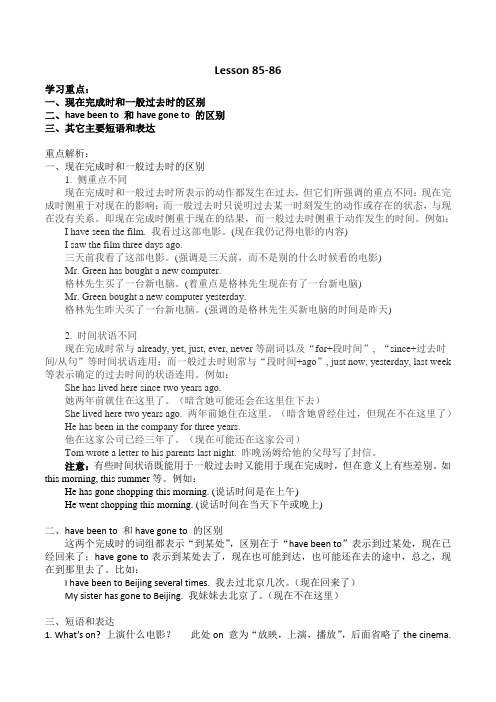
Lesson 85-86学习重点:一、现在完成时和一般过去时的区别二、have been to 和have gone to 的区别三、其它主要短语和表达重点解析:一、现在完成时和一般过去时的区别1. 侧重点不同现在完成时和一般过去时所表示的动作都发生在过去,但它们所强调的重点不同:现在完成时侧重于对现在的影响;而一般过去时只说明过去某一时刻发生的动作或存在的状态,与现在没有关系。
即现在完成时侧重于现在的结果,而一般过去时侧重于动作发生的时间。
例如:I have seen the film. 我看过这部电影。
(现在我仍记得电影的内容)I saw the film three days ago.三天前我看了这部电影。
(强调是三天前,而不是别的什么时候看的电影)Mr. Green has bought a new computer.格林先生买了一台新电脑。
(着重点是格林先生现在有了一台新电脑)Mr. Green bought a new computer yesterday.格林先生昨天买了一台新电脑。
(强调的是格林先生买新电脑的时间是昨天)2. 时间状语不同现在完成时常与already, yet, just, ever, never等副词以及“for+段时间”, “since+过去时间/从句”等时间状语连用;而一般过去时则常与“段时间+ago”, just now, yesterday, last week 等表示确定的过去时间的状语连用。
例如:She has lived here since two years ago.她两年前就住在这里了。
(暗含她可能还会在这里住下去)She lived here two years ago. 两年前她住在这里。
(暗含她曾经住过,但现在不在这里了)He has been in the company for three years.他在这家公司已经三年了。
(现在可能还在这家公司)Tom wrote a letter to his parents last night. 昨晚汤姆给他的父母写了封信。
新概念第一册lesson85-86 Paris in the spring幻灯片课件

Have you just been to the cinema? 你刚刚去过电影院吗? 这是一个现在完成时态的一般疑问句。
just : 刚刚,刚才,现在完成时态的标志 词之一
Have you just been to the cinema? 把这句话变为肯定句: I have just been to the cinema. 你刚刚去了电影院。
I was there last month. I went to Paris last year.
现在完成 时
过去发生的 事对现在的 影响,或从 过去一直持 续到现在的 动作或状态
have/has +过去分词
already, just (肯定句中); never(肯定句 中表否定); ever(疑问句中)
Lesson 85-86 Paris in the spring
1. PCahreicsk /'pæ ris/ n. P巴hon黎etics
2. cinema /'sinimə/ n. 电影院
3. film /film/ n. 电影
4. beautiful /'bjVuo:ctaibfuulal/ry adj. 漂亮的
• Yes,he did.
• 4.At At what time of year did Ken visit Paris?
• He was there in April.
• 5.What’ s the weather like in Paris in spring?
• The weather was awful.
I have already read this book. I read it yesterday. It’s an old book, but it’s interesting.
新概念第一册85-86

I. Revision:
Now let's do some exercises:
II. Complete the sentences with the words given in the correct form. 1. This is the first time I have______(be) been in Australia. is writing 2. My brother__________(write) a letter at the moment. did 3. Tom_____(do) his homework just now, has finished but now he___________(finish) already. goes 4. May often______(go) shopping on Friday, but she ______(stay) at home last Friday. stayed 5. Listen, someone___________(knock) at is knocking the door.
否定式: 主语 + haven’t / hasn't + 过去分词 + 其他。 疑问式: Have / Has + 主语 + 过去分词 + 其他? 简略答语: Yes, 主语 + have / has.(肯定) No, 主语 + haven’t / hasn't.(否定)
(3)一般现在完成时通常与表示不确定的时间副词或短语连用 如 just, already, before, never, ever, twice, three times 等。 (4)现在完成时在汉语中常用“了”、“过”或“已经”来表 示。
(完整版)新概念英语第一册lesson85-86重点解析

(完整版)新概念英语第一册lesson85-86重点解析Lesson 85-86学习重点:一、现在完成时和一般过去时的区别二、have been to 和have gone to 的区别三、其它主要短语和表达重点解析:一、现在完成时和一般过去时的区别1. 侧重点不同现在完成时和一般过去时所表示的动作都发生在过去,但它们所强调的重点不同:现在完成时侧重于对现在的影响;而一般过去时只说明过去某一时刻发生的动作或存在的状态,与现在没有关系。
即现在完成时侧重于现在的结果,而一般过去时侧重于动作发生的时间。
例如:I have seen the film. 我看过这部电影。
(现在我仍记得电影的内容)I saw the film three days ago.三天前我看了这部电影。
(强调是三天前,而不是别的什么时候看的电影)Mr. Green has bought a new computer.格林先生买了一台新电脑。
(着重点是格林先生现在有了一台新电脑)Mr. Green bought a new computer yesterday.格林先生昨天买了一台新电脑。
(强调的是格林先生买新电脑的时间是昨天)2. 时间状语不同现在完成时常与already, yet, just, ever, neve等副词以及“ fo叶段时间” ,“since+过去时间/从句”等时间状语连用;而一般过去时则常与“段时间+ago” , just now, yesterday, last w eek 等表示确定的过去时间的状语连用。
例如:She has lived here since two years ago.她两年前就住在这里了。
(暗含她可能还会在这里住下去)She lived here two years ago.两年前她住在这里。
(暗含她曾经住过,但现在不在这里了)He has been in the company for three years.他在这家公司已经三年了。
新概念英语第一册第85-86课课件 (共26张PPT)
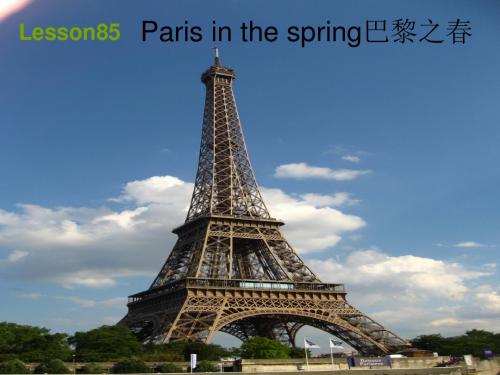
cinema n.电影院 We are going to the cinema tomorrow. 明天我们打算去电影院。
theatre 剧院,戏院
a film star 电影明星/watch/see the film 看电影
例如: We go to the________to see a film. We go to the________to see a play.
film
cinema
new words Paris n. 巴黎
cinema n.电影院
film
n.电影
beautiful adj.漂亮的
city
n城市
never adv.从来没有
ever adv.在任何时候
Paris 巴黎(法国首都)
London 伦敦 (英国首都)
Tokyo 东京 (日本首都)
中表示“以往任何时候”、“曾经”、“在任何 时候”、“从来”这类的意思。
have been to a place与have gone to a place 的区别
have been to: 表示曾经去过某 地,但现在不在 那了,去而已归, 人现在在哪里不 知道。
have gone to: 表示已经去某 地了,现在在 那个地方或正 在去的路上, 去而未归。
Homework
1. To finish the exercises after the text. 2. To practise the structures learned during the class.
A new film is now on. 今天晚上电视上有什么节目?
What’s on television tonight?
新概念第一册 Lesson 85-86

New Words and expressions
Paris /ˈpærɪs/ n. 巴黎
city /ˈsɪti/ n. 城市
cinema /ˈsɪnəmə/ n. 电影院
Hale Waihona Puke never /ˈnevə(r)/ adv. 从来没有
film /fɪlm/ n. 电影
have been to vs. have gone to have been to…到过… E.g. Have you been to Paris? 你到过巴黎吗?(现在不在巴黎。) have gone to …去了… E.g. Have you gone to Paris? 你去了巴黎吗?(现在在巴黎。) have been there 到过那里 have been to the cinema 到过电影院,have been to the park 到过公园 Note: work, school, church之前不加定冠词the。 E.g. have been to work 到过单位
KEN:
It was spring,
____ the weather ___ awful.
It _____ all the time.
GEORGE: Just ____ London!
Lesson 86 What have you done?
What have you done? 你已经做了什么?
乔治:就像伦敦一样!
Role-play
GEORGE: Hello, Ken.
KEN: Hi, George.
GEORGE: Have you just _____ to the cinema?
新概念一Lesson85-86讲义doc
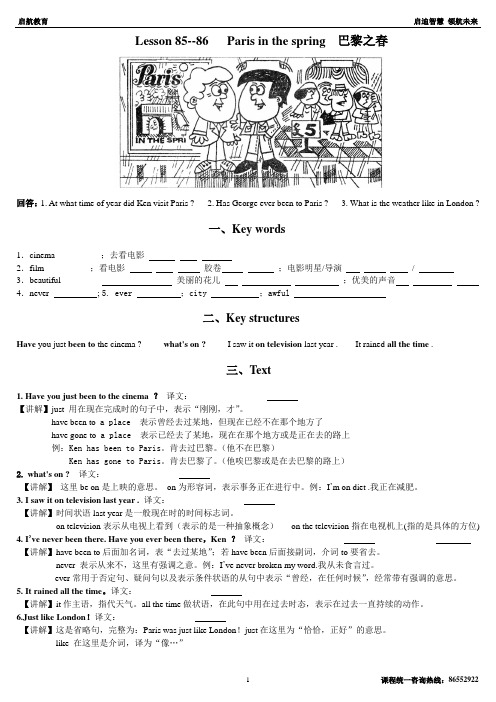
Lesson 85--86 Paris in the spring 巴黎之春回答:1. At what time of year did Ken visit Paris ? 2. Has George ever been to Paris ? 3. What is the weather like in London ?一、Key words1.cinema __________;去看电影2.film __________;看电影胶卷;电影明星/导演/3.beautiful _________ 美丽的花儿;优美的声音4.never ; 5. ever ;city ;awful二、Key structuresHave you just been to the cinema ? what's on ? I saw it on television last year . It rained all the time .三、Text1. Have you just been to the cinema ?译文:_________________ _________________【讲解】just 用在现在完成时的句子中,表示“刚刚,才”。
have been to a place 表示曾经去过某地,但现在已经不在那个地方了have gone to a place 表示已经去了某地,现在在那个地方或是正在去的路上例:Ken has been to Paris。
肯去过巴黎。
(他不在巴黎)Ken has gone to Paris。
肯去巴黎了。
(他唉巴黎或是在去巴黎的路上)2. what's on ? 译文:_________________ __【讲解】这里be on是上映的意思。
on为形容词,表示事务正在进行中。
例:I’m on diet .我正在减肥。
3.I saw it on television last year .译文:_________________ _________________【讲解】时间状语last year是一般现在时的时间标志词。
新概念英语一册课后练习答案Lessons85-86

新概念英语一册课后练习答案Lessons85-86词汇学习 Word studybeautiful adj.(1)美丽的,使生美感的:She was even more beautiful than I had expected. 她甚至比我预期的还要美。
She's a girl with a beautiful voice. 她是一位嗓音美妙动听的姑娘。
(2)出色的,完美的;令人愉悦的:Her French is as beautiful as her English. 她的发文说得和英文一样漂亮。
He did a beautiful job of painting the desk. 他油漆了书桌,活干得很漂亮。
Beautiful weather, isn't it? 天气晴朗宜人,对吗?练习答案 Key to written exercisesLesson 86A1 She has just boiled an egg.3 She has never been to China, but he was there in 1992.4 He has already painted that bookcase.5 He has just dusted the cupboard.B1 I've already cleaned my shoes.I cleaned my shoes last night.2 I've already opened the window.I opened the window an hour ago.3 I've already sharpened my pencil.I sharpened my pencil a minute ago.4 I've already turned on the television.I turned on the television ten minutes ago.5 I've already boiled the milk.I boiled the milk yesterday morning.6 I've already emptied the basket.I emptied the basket yesterday.7 I've already asked a question.I asked a question two minutes ago.8 I've already typed that letter.I typed that letter this morning.9 I've already washed my hands.I washed my hands five minutes ago.10 I've already walked across the park.I walked across the park an hour ago.11 I've already painted that bookcase.I painted that bookcase a year ago.12 I've already dusted the cupboard.I dusted the cupboard this afternoon.。
新概念英语第一册85_86课件

Revision
现在完成时
构成: S(主语) + have/ has+ 动词过去分词 注意:这里的have是助动词,无意义 have-had-had
现在完成时的时间状语(特征词) • already 已经 yet 还 • ever 曾经 never从不 just刚刚 • for+一段时间 • since+时间点 since 2006 • since +时间段+ago
eg:I‘m just making tea for you. 我正要为你沏茶。
2. I've already seen it.
already:已经
eg:I have
already read this book.我 已经读过这本
seen是see 的过去分词
书了。
it:代词
代指“Paris of the spring” 这部电影
since two years ago
2019/8/2
规则动词过去分词和过去式变法一样
1. + ed
clean --- cleaned
2. + d
arrive --- arrived
3. 辅音字母+y结尾的 把y 变i + ed empty --- emptied
• New words
Paris 巴黎(法国首都)
What is the largest city in China? 中国最大的城市什么?
Shanghai is the largest city in China. 上海是中国最大的城市。
city life 都市生活 country life 田园生活或乡村生活
新概念第一册 Lesson85--86课件

sometimes,
I often read books.
He likes music
一般过去 过去发生
过去式 was/were, did
yesterday, last---, --ago, after---
I was there last month. I went to Paris last year.
② My father isn’t in. He has gone to Beijing.
have been to 与 have gone to 的区别:
have been to 表示曾经去过某地, 已经回来了
have gone to 表示去了某地,还没有回 来(可能在路上,可能还在那里)
GEORGE: What's on?
Lesson 86 What have you done? First let's review three tenses:
时态 用法
动词形式 时间状语标 志词
例句
一般现在 一般,经 原形/三单 every day,
时
常,习惯,am/is /are;
真理
dodoes
always, usually, often,
We go to the__ci_n_e_m__a_to see a film. We go to the__th_e_a_t_r_e_to see a play.
★ film n. (1)n.电影 film (英式英语) movie (美式英语)
never & ever
never 从来没有,决不
I
have never been
there.
Lesson 86 What have you done?
新概念英语第一册Lesson85-86(ok)

lesson85
Paris in the spring巴黎之春
Eiffel Tower
The Eiffel Tower a famous landmark in Paris
Arch de Triomphe
Arch de Triomphe is to honour a victory in war.
★never adv . 从来没有 频率副词 never(0%),seldom(20%),sometimes(40%), often(60%),usually(80%),always(100%) (1)通常用于一般动词之前,be动词,助动词之后。 I never had a chance to meet him. 我始终没有机会与他见面。 (2)用于命令句之首。 Never eat too much. 不要吃得太多. Never mind 不必介意
现在完成时的时间状语
• ever 曾经 • never从不
nerver & ever
Never 决不, 从不 I will never forget your kindness. 我永远忘不了你的好意。
ever 曾经,永远,究竟 Have you ever been to Paris? 你去过巴黎吗? 我们会被允许吗? Could we ever get permission?
• • • • •
我爸爸去了香港 My father has gone to H.K.. 我爸爸去过香港 My father has been to H.K.. 我爸爸只有45岁,但是几乎世界上的 所有国家他都去过。 • My father is only 45 years old. But he has already been to nearly every country in the world.
新概念英语第一册Lesson85-86笔记(语法点+配套练习+答案)
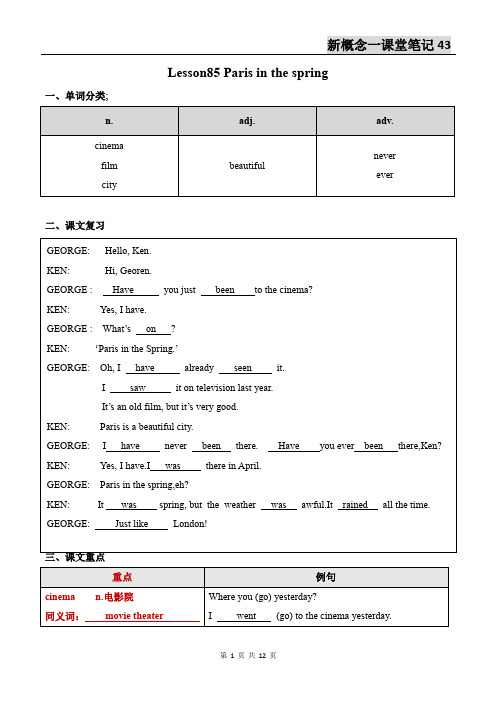
3. Mr. Wang has taught in this schoolforten years.
4.‘Have youeverseen the film?’
‘No, I haveneverseen it.’
5.‘Has the bus leftyet?
‘Yes, it hasjustleft.’
2.过去分词的规则变化:
ABB
原形
过去式
过去分词
原形
过去式
过去分词
通风
air
aired
aired
跳舞
dance
danced
danced
玩
play
played
played
购物
shop
shopped
shopped
变得
Thebeautywho wears abeautifuldress dancesbeautifully.
What abeautiful(beautiful, beautifully) castle!
Howbeautifully(beautiful, beautifully) those birds sing!
Where you (go) yesterday?
Iwent(go) to the cinema yesterday.
Ihave been(be) to the cinema only once.
I likegoing(go) to the cinemato see(see) movies.
How aboutgoing(go) to the movie theater?
新概念英语1Lesson 85-86 (共39张PPT)

你曾经去过西班牙吗? Have you ever been to Spain?
George: Paris in the spring,eh?
Ken: It was spring, but the weather was awful.
① adj. 美丽的,漂亮的 她非常的美 She is very beautiful. 美丽的女人 a beautiful woman 美丽的花 a beautiful flower
★ beautiful ['bju:·ti·fəl] adj. 漂亮的
② adj. 完美的,很棒的 你们真是完美的一对。 You really are a beautiful couple. 多么棒的比赛! What a beautiful game it is! 【扩展】
★ never ['ne·və] adv. 从来没有
② 用于命令句之首 不要吃得太多。 Never eat too much. Never heard of that before? 从来没有听说过么? 不必介意 Never mind.
★ ever
['e·və] adv. 在任何时候
①ever用于疑问句 意为:曾经,以前,至今(中文里有时不译) Have you ever been to Paris? 你曾经去过巴黎吗? Dose she ever laught? 她平时笑吗?
★ seen是see的过去分词
★ it:代词 it代指“Paris of the spring”这部电影
★ on television & on the television
新概念英语第一册85-86课课件

The Eiffel Tower(埃菲尔铁塔), which is 320 meters high, is the symbol of Paris. It was completed in 1889. 320米高的埃费尔铁塔是巴黎的标志。 它建于1889年. 埃菲尔铁塔是巴黎的标 志之一,被法国人爱称为“铁娘子” 。它和纽约的帝国大厦、东京的电视 塔同被誉为西方三大著名建筑。
I’ve just been to the library.
Have you just been to the cinema? 你刚去过电影院吗?
just:刚刚,刚才(通常与完成时连用,有时也 与过去时连用) eg:We have just arrived=We just arrived.我 们刚刚到。 just:正要,刚要(常与进行时或be going to do连用)
cinema We go to the________to see a film. theatre We go to the________to see a play.
Lesson 85 Paris in thespring New words and expressions:
★ film n. (1)(c)n.电影 film 艺术影片(英式英语) movie 好莱坞商业片(美式英语) • 他拍了一部关于西班牙的电影。 He made a film about Spain. make a film about… (2)(u)n. 胶卷,胶片 a roll of film
2、构成 肯定句:主语+ has/have + 动词的过去分词 否定形式:主语+hasn't/haven't + 动词的过去 分词 疑问形式:把 has/have 提前 我已经吃过早饭了。 I have had breakfast. 我没吃早饭呢。 I haven’t had breakfast. 你吃早饭了吗? Have you had breakfast? Yes,I have .(肯定回答)/No,I haven`t.(否定回 答)
新概念第一册Lesson85-86知识点及拓展
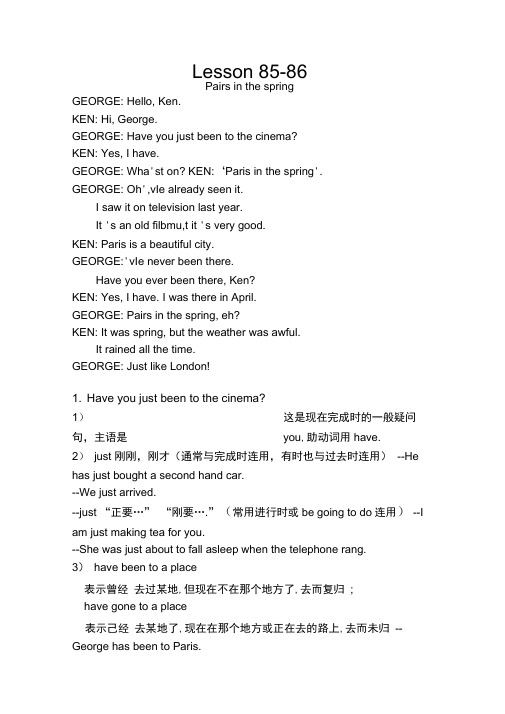
Lesson 85-86Pairs in the springGEORGE: Hello, Ken.KEN: Hi, George.GEORGE: Have you just been to the cinema?KEN: Yes, I have.GEORGE: Wha'st on? KEN:‘Paris in the spring'.GEORGE: Oh',vIe already seen it.I saw it on television last year.It 's an old filbmu,t it 's very good.KEN: Paris is a beautiful city.GEORGE:'vIe never been there.Have you ever been there, Ken?KEN: Yes, I have. I was there in April.GEORGE: Pairs in the spring, eh?KEN: It was spring, but the weather was awful.It rained all the time.GEORGE: Just like London!1. Have you just been to the cinema?1)这是现在完成时的一般疑问句,主语是you,助动词用have.2)just 刚刚,刚才(通常与完成时连用,有时也与过去时连用)--He has just bought a second hand car.--We just arrived.--just “正要…” “刚要….”(常用进行时或be going to do连用) --I am just making tea for you.--She was just about to fall asleep when the telephone rang.3)have been to a place表示曾经去过某地,但现在不在那个地方了,去而复归;have gone to a place表示己经去某地了,现在在那个地方或正在去的路上,去而未归--George has been to Paris.--George has gone to Paris.--Have you ever been to America?--Has he gone go Washington D.C.?--I have been to the library.--H e has gone to the library.4)have bee to the cinema 表示去过电影院--have been to the park 去过公园但在名词school, work, church 之前不加定冠词,它们所表示的是一种抽象概念而不是具体地点或位置。
新概念第一册Lesson85-86知识点及拓展

新概念第一册Lesson85-86知识点及拓展Lesson 85-86Pairs in the springGEORGE: Hello, Ken.KEN: Hi, George.GEORGE: Have you just been to the cinema?KEN: Yes, I have.GEORGE: What’s on?KEN: ‘Paris in the spring’.GEORGE: Oh, I’ve already seen it.I saw it on television last year.It’s an old film, but it’s very good.KEN: Paris is a beautiful city.GEORGE: I’ve never been there.Have you ever been there, Ken?KEN: Yes, I have. I was there in April.GEORGE: Pairs in the spring, eh?KEN: It was spring, but the weather was awful.It rained all the time.GEORGE: Just like London!1. Have you just been to the cinema?1)这是现在完成时的一般疑问句,主语是you,助动词用have.2)just 刚刚,刚才(通常与完成时连用,有时也与过去时连用)--He has just bought a second hand car.--We just arrived.--just “正要…”“刚要….”(常用进行时或be going to do 连用) --I am just making tea for you.--She was just about to fall asleep when the telephone rang. 3)have been to a place表示曾经去过某地,但现在不在那个地方了,去而复归;have gone to a place表示己经去某地了,现在在那个地方或正在去的路上,去而未归。
- 1、下载文档前请自行甄别文档内容的完整性,平台不提供额外的编辑、内容补充、找答案等附加服务。
- 2、"仅部分预览"的文档,不可在线预览部分如存在完整性等问题,可反馈申请退款(可完整预览的文档不适用该条件!)。
- 3、如文档侵犯您的权益,请联系客服反馈,我们会尽快为您处理(人工客服工作时间:9:00-18:30)。
卡罗尔:你好,萨姆。 进来吧。
汤 姆:你好,萨姆。我们正在吃午饭, 你跟我们一起吃午饭好吗?
萨 姆:不,汤姆,谢谢。我已经吃过饭了。 我在12点半吃的。
卡罗尔:那么喝杯咖啡吧。
萨 姆:我刚喝了一杯,谢谢。我是在饭后喝的。 汤 姆:我们到客厅里去吧,卡罗尔。我们可以在 那里喝咖啡。
adj.完美的,很棒的
What a beautiful game it is! 多么棒的比赛!
与同义词的区别
beautiful表示接近和谐理想的美 pretty表示可爱,令人怜爱 good-looking 指容貌美 handsome指容貌端正英俊的(多指男子)
city
a large city 大都市
Paris
film
cinema
Fairy Lake
Xinyu is a beautiful _______. city
new words Paris n. 巴黎 cinema n.电影院 film n.电影 beautiful adj.漂亮的 city n城市
never
ever
adv.从来没有
(2)用于命令句之首。 Never eat too much.不要吃得太多。
Never mind
不必介意
ever
(1)用于疑问句,意为:曾经,以前,至今(中文里 有时不译) Have you ever been to Paris?你曾去过巴黎吗? No,never.没有去过
(2)与最高级,比较级连用,意为:至今 This is the best film that I have ever watched. 这是我至今为止看过的最好的一部电影。
(Triumphal Arch 巴黎凯旋门 [traɪ'ʌmf(ə)l ɑːtʃ]
)
• 凯旋门坐落在巴黎市中心戴高乐星 形广场的中央,又称星形广场凯旋 门,是Napoleon(拿破仑)为纪念他 在奥斯特利茨战役中大败奥俄联军 的功绩,于1806年2月下令兴建的, 1836年建成。它是欧洲100多座凯 旋门中最大的一座,高50米,宽45 米。厚约22米。
on television.
我在电视上看到
It's on the
television.在电视 机上。
过她。
KEN: Paris is a beautiful city. GEORGE: I've never been there. Have you ever been there, Ken? KEN: Yes, I have. I was there in April. in April 月份前面不用冠词 never与ever都是完成时的标 志词,but never通常用于陈 述句中,表示绝不,从来没有, 而ever通常用于疑问句中,表 示曾经,在任何时候
Lesson85
Paris in the spring巴黎之春
Review
mess [mes] n.杂乱,凌乱 pack [pæ k] v.包装,打包,装箱 suitcase ['su:tkeis, 'sju:t] n.手提箱 leave [li:v] v.离开 already [ɔ:l'redi] ad.已经
GEORGE: Hello, Ken. KEN: Hi, George. GEORGE: Have you just been to the cinema? KEN: Yes, I have.
Have you just been to the cinema? 你刚去过电影院吗?
just:刚刚,刚才(通常与完成时连用,有时也 与过去时连用) eg:We have just arrived=We just arrived.我 们刚刚到。 just:正要,刚要(常与进行时或be going to do连用)
Put the phrases into English
have a holiday go on holiday • 度假 • 去……度假 go … for holiday • 到客厅里去 go into the living room • 屋子很乱,请原谅。 Excuse the mess pack the suitcases • 收拾行李 stay at home • 呆在家里 have some beer • 喝一些啤酒 have a peach • 吃一个桃子 have a glass of water • 喝一杯水 have a biscuit • 吃一块饼干 have some cheese • 吃些奶酪 have some steak • 吃牛排
adv.在任何时候
Paris 巴黎(法国首都)
London 伦敦
(英国首都)
Tokyo 东京 (日本首都)
Washington 华盛顿(美国首都)
cinema n.电影院
words
We are going to the cinema tomorrow.(movie / theater<美语>电影院) 明天我们打算去电影院。 film n.电影
卡罗尔:屋子很乱,请原谅,萨姆。
房间里乱七八糟。我们正在收拾手提箱。 明天我们就要走了。我和汤姆准备去度假。 萨 姆:你们真幸运! 汤 姆:萨姆,你准备什么时候去度假? 萨 姆:我不知道。今年我已度过假了。 卡罗尔:你去哪儿了? 萨 姆:我呆在这里了!
Proverbs
in spring / summer / autumn / winter 在季节前 不用加任何冠词‘Paris in the spring这指的是一个春 天在巴黎发生的事情,所以 加了定冠词
I've already seen it.我已经看过了。
already:已经
eg:I have already read this book.我 已经读过这本 书了。
句子翻译对比
玛丽去过巴黎 玛丽去巴黎了 我去过长沙 我去长沙了
Mary has been to Paris.
(表示现在不在巴黎) Mary has gone to Paris. (表示她在巴黎或在去巴黎的路上) I have been to Changsha.
(表示现在不在长沙) I have gone to Changsha. (表示现在在长沙或在去的路上)
eg:I'm just making tea for you.我正要为你 沏茶。
have been to a place与have gone to a place 的区别
have been to: 表示曾经去过某 地,但现在不在 那了,去而已归, 人现在在哪里不 知道。 have gone to: 表示已经去某 地了,现在在 那个地方或正 在去的路上, 去而未归。
GEORGE: Hello, Ken. KEN: Hi, George. GEORGE: Have you just been to the cinema? KEN: Yes, I have. GEORGE: What's on? KEN: 'Paris in the spring'. GEORGE: Oh, I've already seen it. I saw it on television last year. It's an old film, but it's very good.
KEN: Paris is a beautiful city. GEORGE: I've never been there. Have you ever been there, Ken? KEN: Yes, I have. I was there in April. GEORGE: Pairs in the spring, eh? KEN: It was spring, but the weather was awful. It rained all the time. GEORGE: Just like London!
It
is never too old to learn. 活到老,学到老。 Far from eye, far from heart. 眼不见,心不烦。
艾菲尔铁塔 Eiffel Tower ['aɪfəl] ['taʊə] The Eiffel Tower, which is 320 meters high, is the symbol of Paris. It was completed in 1889. 320米高的埃费尔铁塔是巴黎的标志。 它建于1889年. 埃菲尔铁塔是巴黎的 标志之一,被法国人爱称为“铁娘 子”。它和纽约的帝国大厦、东京的 电视塔同被誉为西方三大著名建筑。
a film star 电影明星/watch/see the film 看电 影
film n.胶卷,底片
Please give me a roll of film. 请给我一卷胶卷。
beautiful adj. 美丽的,漂亮的
a beautiful flower 美丽的花 a beautiful woman 美丽的女人
have been 后加副词: 去过某地,介词“to” 要省略。 eg:I have been there.我去过那。
eg:I have never been there. 我从未去过那。 never 从来,表强调。
have been to:在名词school,work,church 之前不加定冠词,她们所表示的是一种抽象 概念,而不是具体地点或位置。
GEORGE: What's on? ———— KEN: 'Paris in the spring'. GEORGE: Oh, I've already seen it. I saw it on t的意思, It's an old film, 也可理解成在荧幕上 but it's very good.
